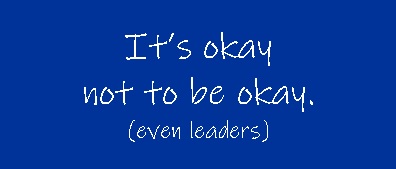What mental health needs is more sunlight, more candor, and more unashamed conversation. ~Glenn Close

Leaders and suicide. You might be thinking, “wow, that’s an awfully dark topic,” and that’s the point. Just as Glenn Close stated, “mental health needs more unashamed conversation.” We need to take it out of the darkness and bring it into the light.
Maybe it’s just a part of growing older, but the number of people I have personally known who have ended their lives by suicide now requires two hands to count. And that’s too many. What has also struck me is that most of the people I have personally known, have been leaders.
Suicide Awareness
This topic has been especially highlighted for me because not only is September suicide awareness month, but the day before World Suicide Prevention Day two leaders ended their lives by suicide and I had connections to both. NBC News: Suicides by Two Mental Health Advocates Serve as Grim Reminder
It’s easy to see someone in a prominent leadership role and to assume that they have no personal challenges. Even more so, I think many leaders feel pressured to come across and act as if they have no challenges. Almost, as if they aren’t actually human. It’s only been in recent years in the study of leadership that vulnerability has been considered an attribute, as opposed to a detriment, of effective leadership.
But the vulnerability attached to admitting depression or suicidal thoughts still seems to haunt some leaders. Just because you are in a leadership role doesn’t mean you are immune from the mental health challenges associated with suicidal thoughts.
Here’s what a college president said after learning about one of the recent suicides I mentioned. “As I confront my own grief and bewilderment, I am also becoming more aware of what suicide does and does not mean, and how to respond. I am learning to avoid judgment and not to seek simplistic explanations… I am learning that it is important to talk openly about suicide.”
How do you talk openly about suicide, even with a leader?
Here’s what the Mayo Clinic recommends. Be sensitive, but ask direct questions, such as:
- How are you coping with what’s been happening in your life?
- Do you ever feel like just giving up?
- Are you thinking about dying?
The Clinic goes on to say, “Asking about suicidal thoughts or feelings won’t push someone into doing something self-destructive. In fact, offering an opportunity to talk about feelings may reduce the risk of acting on suicidal feelings.”
Forbes contributor Naz Beheshti stated earlier this month, “In spite of increased awareness, suicide continues to be a major public health problem in the United States, and around the world. Suicide is the tenth leading cause of death in the U.S., where the rate is higher than at any point since World War II. The majority of suicides in the U.S. are among working age adults. Working age suicides have increased 34% in the U.S. in the years 2000-2016, according to a report by the Centers for Disease Control and Prevention.”
We all need to come out of the darkness, including leaders, maybe even especially leaders. We need more unashamed conversation about suicide.
In 2017, 47,173 Americans died by suicide. There were twice as many suicides (47,173) in the U.S. as there were homicides (19,510).



